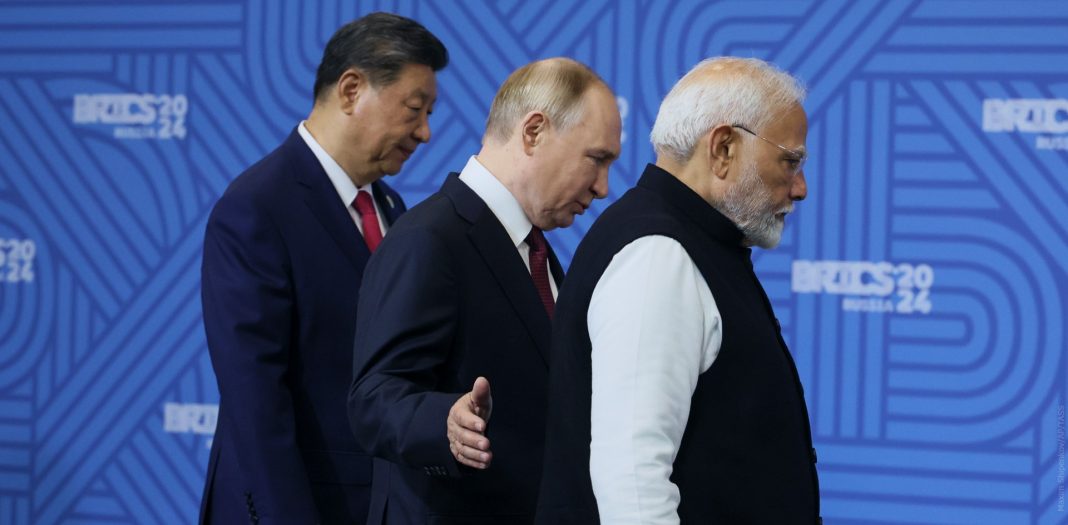The BRICS summit held in Kazan on October 22-24 was the most representative international forum for Russia since its full-scale invasion of Ukraine. The world media, both Western and non-Western, were exceptionally unanimous in their discussion of the BRICS summit. Their common conclusion was that Russia had succeeded in demonstrating to the West that Moscow was not isolated at the geopolitical level.
However, the world leaders who came to the summit had their own view and their own, much more pragmatic agenda, which did not coincide with Russia’s.
In this article Ascolta analyzes the results of the BRICS summit and examines the main positions of the leaders of the BRICS member states, their convergences and differences. It also focuses on the key issues on the agenda and the prospects for the impact of the BRICS summit in Kazan on the future policies of the Global South and the collective West.
This Content Is Only For Subscribers
“Look who’s here”.
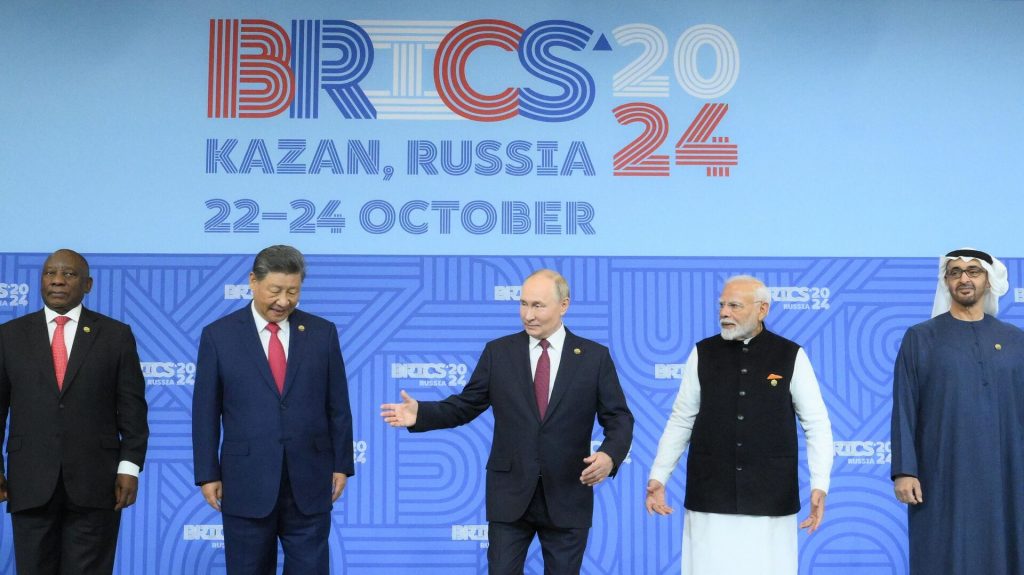
Twenty-two heads of state, mostly representing the Global South, arrived in Kazan for the BRICS summit. At the airport of the capital of Tatarstan, all arrivals were greeted with the Tatar national dish chak-chak. Among the arrivals were almost all the leaders of the immediate member countries of the club – China, India, South Africa, as well as Egypt, Iran, UAE and Ethiopia, which joined from January 1, 2024. Only Brazil’s President Lula da Silva was not at the common table, and even then for a good reason – the day before he had bruised the back of his head. In the end, the country was represented by Foreign Minister Mauro Vieira.
Leaders from Armenia, Azerbaijan, Mongolia, Belarus, Congo, Laos, Kyrgyzstan, Kazakhstan and other countries also arrived. One of the most notable guests was the President of NATO member Turkey, Recep Tayyip Erdogan, who had earlier announced his country’s intention to join BRICS. There were also guests who fell outside these categories, such as Milorad Dodik, leader of the Republika Srpska, part of Bosnia and Herzegovina, or Musa Abu Marzu, deputy head of the political bureau of the radical Palestinian movement Hamas.
UN Secretary General António Guterres was a notable participant of the summit in Kazan. His presence at previous BRICS summits did not embarrass anyone, but the fact that he came to Russia this time caused negative reactions in a number of countries. First of all, the Ukrainian Foreign Ministry was outraged. They said that the UN secretary general again made “the wrong choice”: first he refused to participate in the June “peace summit” in Switzerland, and now he came to Kazan at the invitation of Russian President Vladimir Putin. “This only harms the reputation of the UN,” the Ukrainian Foreign Ministry concluded.
Farhan Haq, the UN deputy spokesman, responded to the critics by explaining that “the BRICS countries represent about half of the world’s population” and therefore the summit “is of great importance for the work of the UN. In addition, according to Mr. Haq, Mr. Guterres was going to speak separately with Mr. Putin and confirm to him “his well-known positions” on the Russia-Ukraine conflict.
In addition to Brazilian President Lula da Silva, who was absent at the summit, Crown Prince Mohammed bin Salman of Saudi Arabia did not fly to Kazan, sending his foreign minister instead. Saudi Arabia’s very status in the organization is not entirely clear. The kingdom received an official invitation to join BRICS together with Argentina, and unlike Argentina, the power there has not changed. According to the Russian Foreign Ministry’s version, confirmed by Deputy Minister Sergei Ryabkov, Saudi Arabia is an undisputed member of BRICS, and the invitation to the summit was personally handed to the Crown Prince by Minister Lavrov, and there was no refusal. However, according to Saudi sources, the country participated in all BRICS events as an invitee, not as a full participant who accepted the invitation.
Ben Salman did not come to Kazan and did not even speak via video link. The Saudi foreign minister, unlike the Brazilian one, did not participate in the BRICS meeting with a narrow group of only full members and did not sign the joint Kazan Declaration. The reason for this could be the unwillingness to share the anti-Western bias of the organization, supported by the corresponding pressure from Western diplomacy, the contradictions between Russia and Saudi Arabia in the oil market, and the fact that the Saudis’ regional rival Iran, which gladly accepted full membership in BRICS, has become so close to Moscow that the Saudis would literally feel like a third extra against the background of this new friendship.
Serbian President Aleksandar Vucic, who had also been invited to Kazan, did not come either. The Serbian leader explained that he had arranged a meeting with Polish Prime Minister Donald Tusk in advance. But even without that, Mr. Vucic noted, it “would have been extremely difficult for him to come to Russia because of various circumstances.” By these, he most likely meant the powerful pressure from the West.
The Kazan summit was the first since BRICS agreed to expand its membership by six countries at last year’s summit in South America. However, despite the numerous applications for membership from new countries, BRICS faced the question of how to “digest” such a large number of countries within one platform. As a result, a decision was made to create “partner state criteria” in accordance with which further expansion would take place. Russian Foreign Minister Sergei Lavrov refused to answer the question about which countries are applying for BRICS partner status. Previously, there had been about 30 applications, but already at the summit the figure of 13 countries claiming the status of partner states was heard.
It is likely that the examples of Argentina, which was admitted to the club but never joined it under the new authorities, or Saudi Arabia, which is in an unknown status, have made the current members of the association more careful in their approach to expansion. There are also examples when countries are in confrontation with each other or with their allies. For example, it became known that Turkey’s entry into BRICS is opposed by India because of Ankara’s good relations with Pakistan. Sinan Ulgen, a former diplomat and expert on Turkish foreign policy at the Carnegie Endowment for International Peace, made this assessment to the German publication Bild.
In his view, Turkish President Recep Tayyip Erdogan is disillusioned with the EU, so he wants a rapprochement with Vladimir Putin and Xi Jinping’s alliance to strengthen Turkey’s “strategic autonomy” and to show that he “can sit at the tables of NATO and BRICS at the same time” because he considers himself a “mediator” in the international arena. But for now, he will have to bury the idea of joining BRICS because of his good relations with India-unfriendly Pakistan.
There was another example. Brazil blocked the admission of Venezuela, which had high hopes of joining BRICS during the Russian presidency. And it blocked it because of the violation of democratic electoral procedures, which was unpleasant for the Kremlin.
Against the backdrop of the long list of those wishing to join BRICS, President Tokayev’s statement about the lack of interest in joining was well heard, as Kazakhstan is already sufficiently integrated into structures involving Russia and China and would not gain anything new here. While BRICS, especially at the Kazan summit, looked more and more like a support group for Russia, Kazakhstan’s position was indeed reminiscent of the best days of the Non-Aligned Movement.
Ukraine and the Middle East
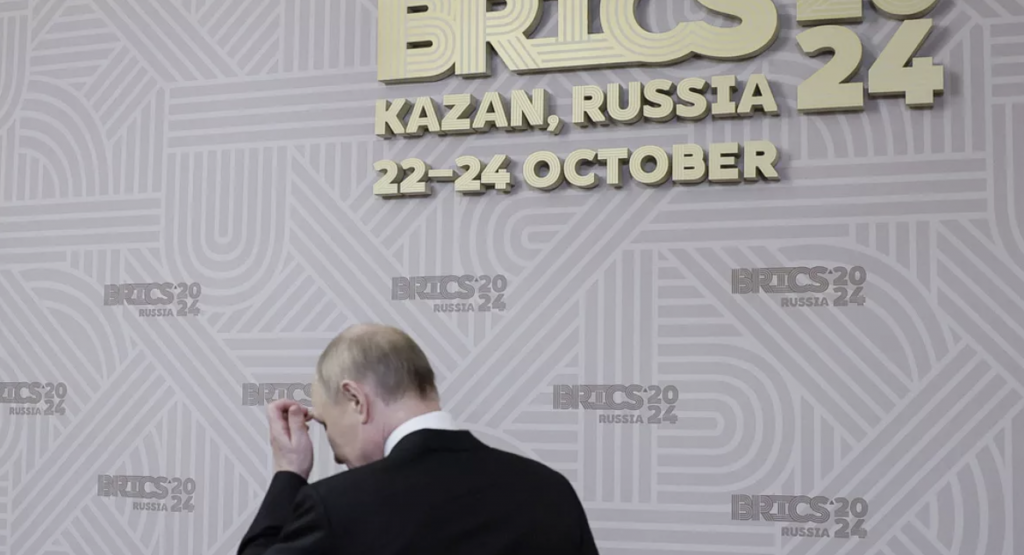
As in the declarations of the two previous summits, the Kazan document devoted only one paragraph to Russia’s war against Ukraine; it said the sides reminded each other of their national positions on “the situation in and around Ukraine.” “We emphasize that all states must act in accordance with the purposes and principles of the UN Charter in their entirety and interconnectedness. We note with satisfaction the relevant offers of mediation and good offices to ensure a peaceful resolution of the conflict through dialogue and diplomacy,” the document says. As we see in the documents on Ukraine, Russia was not supported in a written declaration even in the form of general words that the West and NATO are also to blame. However, this topic was repeatedly voiced on various platforms of the summit.
Narendra Modi did not touch on the war in Ukraine in his speech, but the topic was one of the main topics during his bilateral meeting with Putin on October 22. As India’s first deputy foreign minister Vikram Misri said after the talks, New Delhi is “probing the possibility of finding a peaceful way to end the conflict, and possibly also looking for alternative approaches that may not be on the table at the moment”.
Xi Jinping twice during the summit recalled the Friends of Peace group established by the PRC and Brazil, which also included other countries of the Global South. “It is important, based on the principles of avoiding the spillover of conflicts, its extension to third countries and beating the escalation of hostilities and refraining from pouring oil on the fire, to promote the early de-escalation of the situation,” he said. The Brazilian president, who took part in the meeting via video link, said there should be no further escalation and that peace talks should begin. Kazakh President Kasym-Jomart Tokayev, in turn, expressed support for the peace plan proposed by China and Brazil.
On the eve of the declaration’s release, the Kremlin also said it welcomed the Sino-Brazilian initiative on Ukraine and considered it useful. Putin discussed it with Lula da Silva (remotely) and in a closed-door meeting with Xi Jinping.
We shall remind you that the peace plan of China and Brazil implies, among other things, stopping the war along the front line, “refraining from strengthening and expanding military blocs” (i.e. Ukraine’s neutrality), and “refraining from unilateral sanctions”. Not all points of this initiative coincide with Putin’s “peace plan” announced back in June, which implies not a halt to the war along the front line, but a demand for Ukraine to withdraw its troops from four regions. Nevertheless, the Kremlin actually supported the Brazil-China plan. However, a number of questions remain. It is unclear whether the support for the Sino-Brazilian plan indicates a real change in the Russian Federation’s position on the conditions for ending the war and the removal of the demands for withdrawal of troops from the four regions. Or it is a diplomatic ploy by the Kremlin, which realizes that Ukrainian President Volodymyr Zelensky will reject the initiative of Beijing and the Brazilians anyway, and therefore it can be supported in order to strengthen relations within BRICS and show that the group is a “united front” on the topic of the war in Ukraine.
Kiev has taken the paragraph of the Kazan declaration on the war in Ukraine as proof that “Russia failed to impose its views on aggression against Ukraine”. The Foreign Ministry said in a statement: “We believe that this text actually demonstrates that Russia failed to “export” to the participants of the BRICS summit its neo-imperialist views on changing the world order and global security architecture through aggression against Ukraine. Moscow’s attempts to impose ideas about the allegedly alternative position of the so-called global South have suffered yet another fiasco”.
In addition, the declaration makes no mention of the need to refrain from strikes on energy, shipping, or the use of nuclear weapons. And it is precisely on these points that Kiev might have had hope to pressure China, India and Brazil on the Kremlin. Especially since on the eve of the summit, Ukrainian President Volodymyr Zelensky said that ending mutual strikes on energy infrastructure would be the first step toward ending the war. However, judging by the declaration, even if these issues were raised by the BRICS leaders (which is not a fact), Putin was not convinced.
Another important topic of the summit was the ongoing fighting in the Gaza Strip and the spread of the conflict to Lebanon. According to Putin, the current situation in the Middle East resembles a “chain reaction” and brings the entire region to the brink of all-out war. The Russian leader said that the only way to break the “vicious circle of violence” is to create a full-fledged Palestinian state. Other members of the association also called for an immediate truce in the Middle East and the admission of Palestine to the UN as a full member (all BRICS members also voted in favor of the relevant UN General Assembly resolution of May 10, 2024).
On de-dollarization and multipolarity
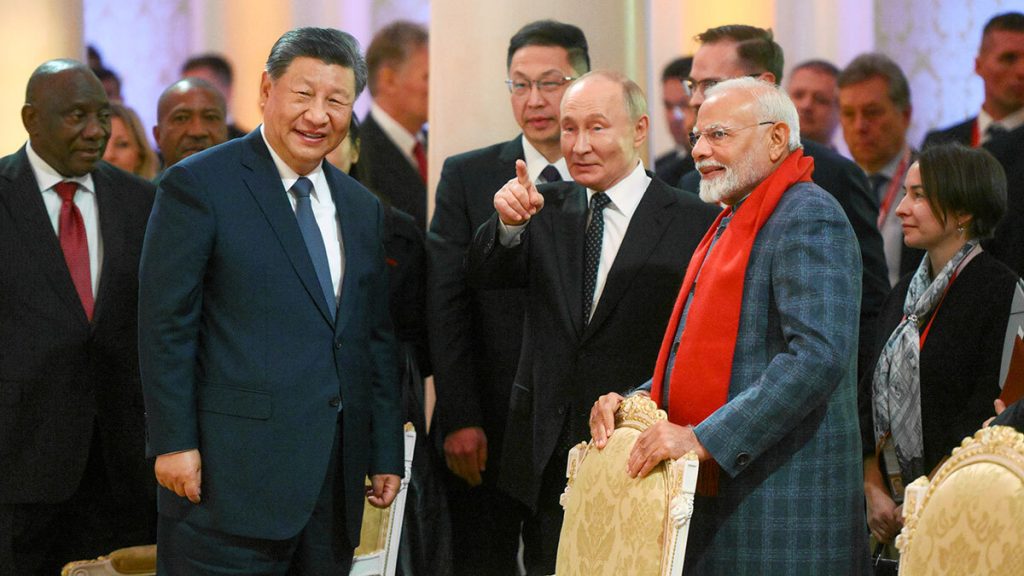
In the run-up to the summit, The Economist wrote that Russian President Vladimir Putin would present his plan to “defeat the dollar” at the Kazan summit. According to the publication, the Russian president hopes to “give unification weight” by building a new global financial and payment system to hit U.S. dominance in the global financial system and protect Russia and its partners from sanctions. Putin hopes to capitalize on the “dollar frustration” of BRICS member countries, and the creation of a new financial scheme would be an “urgent priority” and a “geopolitical strategy” for him. “Increasing the volume of transactions in local currencies makes it possible to reduce debt service payments, increase the financial independence of BRICS countries and minimize geopolitical risks as much as possible,” Putin said in Kazan at a meeting with Dilma Roussef, president of the New BRICS Development Bank.
It is no secret that the BRICS members are really interested in settlements in national currencies. After all, such settlements with the same Russia help other countries to save hard currency, and China to promote as a reserve currency of its own. The interest in alternatives to SWIFT and, in general, decentralization and diversification of the global financial system is also quite real. A grain exchange could help the Global South to compensate, if not for global fluctuations, at least for the chaos that Russia caused by interrupting supplies of Ukrainian grain. However, if we understand, the so-called “dedollarization” has more plans than real content.
Thus, the talk about a separate BRICS Bride payment system, which would allow avoiding the use of dollars and euros, once again remained talk. Widely publicized loans in yuan, which were supposed to replace loans in dollars and euros for Russians, turned out to be a fiction. Chinese banks are afraid of secondary Western sanctions, so they do not provide cash for loans in Russia. Actually the fact that the issue of “dedollarization” will be considered at more than one summit was fixed in the final declaration. “The BRICS countries will promote the use of national currencies in financial transactions between the BRICS countries and their trading partners. We instruct the finance ministers and central bank governors of our countries to give due consideration to the use of national currencies, payment instruments and platforms and report on the results during the next chairmanship,” the declaration states.
It is worth noting that for all the talk about creating a new currency and “dedollarization”, the summit website reminded guests that they should take cash with them. Mastercard and Visa do not work in Russia because of sanctions, and the Chinese payment system Union Pay does not work everywhere and not always, so only cash dollars and euros can be freely exchanged for cash rubles in Russian banks. Such is the crisis of the Bretton Woods system…..
The declaration also contains many points that generally reflect the agenda for changing the world order – support for “multipolarity”, calls for a more equitable world order, for an increased role of representatives of non-Western countries in the management of international institutions (in particular, the IMF), and criticism of “unilateral coercive measures, including illegal sanctions”.
It is Beijing that is trying to build an alternative world order, pulling the countries of the southern hemisphere into its economic orbit, challenging US hegemony. And as much as Russia is striving for primacy. Without any echoes, we can say that Chinese leadership is evident. And not only in BRICS, but in everything that concerns the construction of a multipolar world alternative to the West.
There is an unspoken rule: there cannot be many leaders, there is always one leader. No, officially in an organization, of course, everyone is equal. But someone has a little more weight than the rest. It is noteworthy that Alexander Lukashenko announced his intention to run for president for the seventh time at the BRICS summit, and not in a conversation with the working masses of Belarusian enterprises or in the field among the villagers at harvesting. Alexander Grigorievich chose a status event for this purpose. And it was said in an interview with the Russian state TV channel. What does Chinese leadership have to do with it? It is believed that Alexander Grigorievich has recently become very close to Comrade Xi. Perhaps, the latter will favorably consider the intention of the Belarusian leader. He is the host of the summit and his TV channel is interviewing him.
Beijing is interested in having a partner like Russia on its side, which also seeks a just world order and to oust Washington from spheres of influence it considers its own.
On the sidelines of the summit, Xi said that the “deep friendship” between Russia and China would not change amid the global “chaos.” Putin, in turn, called Xi Jinping his “dear friend” and characterized Russian-Chinese cooperation as “wide-ranging.” Russia and China are increasingly coordinating their positions in the UN Security Council, where both countries have veto power and jointly oppose the United States. Military cooperation is deepening, and Russia has sold some of its advanced weapons systems to China. Although Beijing seeks to position itself as a neutral party in the Russia-Ukraine war, Kiev’s U.S. and European allies accuse China of serving as the Kremlin’s economic lifeline.
Opening the summit in Kazan, Vladimir Putin said that the recently expanded BRICS group had demonstrated that a “multipolar world” was being created to challenge the US-dominated world order.
However, not all countries want BRICS to turn into an anti-American body dominated by China and Russia. Indian Prime Minister Narendra Modi said BRICS should not be positioned as an alternative to global organizations. “We must be careful that this organization does not acquire the image of an organization that is trying to replace global institutions,” Modi said in Kazan.
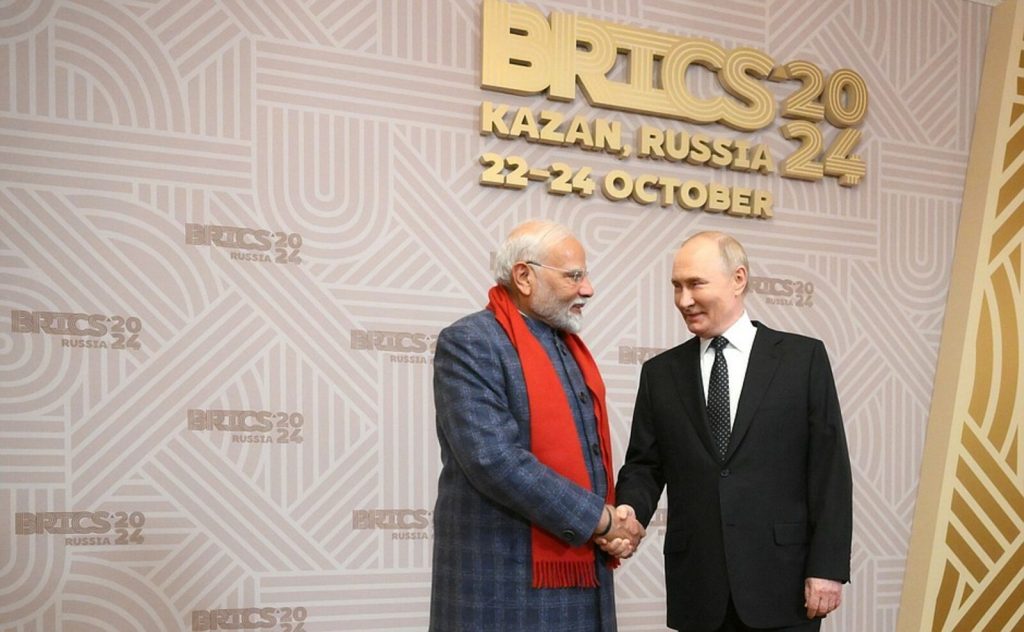
According to experts, such statements by the Indian prime minister show Modi’s difficulties in trying to balance relations with Russia, on which India depends for cheap oil supplies, and the United States, which provides New Delhi with access to advanced technologies to increase production and create new jobs. So it is no coincidence that Modi has been signaling that BRICS is not the end of the world and is looking for new partners, showing his multi-vectorism. He left the summit early, traveling to the Indian capital for a meeting with German Chancellor Olaf Scholz.
The growing importance for India of relations with Germany was emphasized by Subramaniam Jaishankar last month. “We believe that Germany should take more interest in the Indo-Pacific region, just as we in India are striving to do in the Euro-Atlantic,” the Indian foreign minister told a conference of heads of German missions abroad in Berlin. The main topics of the meeting between Olaf Scholz and Narendra Modi were “strengthened security and defense cooperation, greater opportunities for talent mobility, deeper economic cooperation, partnership in green and sustainable development and cooperation in new and strategic technologies”.
After his visit to the Indian capital, Olaf Scholz will travel to Goa, but not for a brief weekend in the popular Indian resort before returning home. In Goa, the German leader will visit the frigate Baden-Württemberg and the combat support ship Frankfurt am Main stationed in the port of Vasco da Gama. These ships came to India as part of the Bundeswehr’s program to deploy the German Navy in the Indo-Pacific region. The Commander-in-Chief of the German Navy, Vice Admiral Jan Christian Kaak, explained in an interview with The Japan Times that the growing presence of the German Navy in the region is meant to send a signal that Berlin will not allow disruption of key international sea lanes. Vice Admiral Kaak named China as the main disruptor, recalling that China “has launched an unprecedented naval weapons program and now has a fleet of more than 350 ships.
Berlin’s growing interest in containing the Chinese presence in the Indo-Pacific region has served as a strong impetus for the development of military-technical cooperation between New Delhi and Berlin, including its maritime component. Against the backdrop of the sharp intensification of ties between the Indian and German navies on the eve of Olaf Scholz’s visit, leading Indian media outlets leaked that one of the main objectives of the talks would be to discuss a project to build six submarines at Indian shipyards. According to the Indian newspaper The Economic Times, Germany is close to winning the tender, but the final decision has not yet been made. During Olaf Scholz’s visit to India, this topic will be one of the main ones in discussing a block of issues related to military-technical cooperation between the two countries.
However, it is not only Germany and the West in general that is worried about China. Modi is also worried about it. The fact is that Beijing is increasing its presence near India. The Maldives presidential election was won by Mohamed Mizzou, who outlined a new course of rapprochement with China after years of partnership with India. Chinese positions are strong in another Indian neighbor, Sri Lanka. And the defeat of Modi’s party in the recent local elections in Kashmir after the national government stripped the region of autonomy and statehood is attributed by some to Beijing’s hand through its partner Pakistan. That is why the BRICS margins talks between Xi Jinping and Narendra Modi that took place, for the first time after 2019, were the highlight of the Kazan summit and its biggest surprise.
After at least 20 Indian soldiers were killed in a border clash in 2020, Narendra Modi took a series of steps to block investment flow from China, going further than the US. India has imposed strict rules on businesses from China that wanted to invest in the Indian economy. These measures have led to the collapse of several investment projects, including a $1 billion plan to produce electric cars in India.
Now New Delhi believes it may have overreacted. At the meeting, the two leaders promised to stabilize relations. Xi said both sides should strengthen cooperation and manage differences. India in turn said special representatives from both countries will meet to plan the next steps. Indian companies this year have stepped up pressure on the Modi government to ease restrictions. It has become clear that the tough stance on China is also having the opposite effect and hurting Modi’s drive to attract more high-tech manufacturing, including chip production. China has had its own problems with trade barriers and U.S. competition for technology. Beijing has recently sought to improve its relations with U.S. allies Australia and Japan, and has tried to overstretch relations with Britain as it looks to find common ground with Keir Starmer’s Labor government, dreading the arrival of Donald Trump in the White House, who has threatened China with 60 percent duties.
However, it is unclear how far India will go in softening its stance. New Delhi still does not have much confidence in China. There, it is not sure that Beijing is not using improved economic relations for geopolitical purposes, trying to turn India away from the US-backed Quad military alliance, which also includes Japan and Australia. If China and India do reach an agreement, it will be a turning point for the further development of BRICS, transforming it from a club of interests into a truly new center of world geopolitics.
Nevertheless, despite the fact that BRICS has become a powerful symbol of the falling prestige of the United States in the Global South, it is still far from being the second center of the world. Many countries are reassuring themselves and looking for new partners to pursue their national interests. States continue to use their relationships with either the West or the BRICS as leverage to achieve their goals – whether it is obtaining key technologies and advanced military hardware or a strong position in trade negotiations. This is why, as British economist Jim O’Neill, author of the acronym BRIC (the original name of the organization before South Africa joined), notes, many of the countries of the “global South” are reluctant to choose either the BRICS side or the “traditional West” side.
“The basic idea that led me to this acronym at the time was the deplorable state of what is known in English as ‘global governance’ – the world order and how it is reflected and controlled by international institutions. Today, 23 years later, global governance is in an even worse state than it was then,” concluded the former chief economist at Goldman Sachs.
When one speaks of a multipolar world, it implies not only the absence of the sole political hegemony of the collective West in the modern world. It implies either the destruction or the creation of parallel institutions of world governance, which were and still are in the hands of the West. Therefore, judging by the Kazan Declaration, the BRICS countries, in their struggle for a “fair model of the world order,” intend to give more weight to international institutions such as the UN Security Council, the IMF, and the WTO by expanding the representation of developing countries in them.
Yet the BRICS summit in Kazan left many unanswered questions. Despite the fact that Russia has demonstrated that it “cannot be canceled,” economically Moscow is becoming an increasingly isolated subject of global trade relations. And any countries, including the BRICS, that want to do business with it risk falling under secondary sanctions. And this is unlikely to change anytime soon. It was evident that at the summit Russia tried to emphasize the economy and finance. Judging by the leader’s statements and the text of the declaration, it is not going to go to war with the dollar. There were no harsh statements against former Western partners either. However, it wants an alternative settlement system.
Another weakness of BRICS is the vagueness of the format. On the one hand, it is attractive for new members, but on the other hand, it does not provide tools in the applied sense – harmonization of common policy statements, etc. And there are plenty of such inconsistencies. In general, despite the great desire to reorganize the world and become a new center of the international world order, BRICS is still largely a club of interests. However, the crisis of global governance, when the collective West can no longer, and the Global South no longer wants to live according to the old models, may give a new impetus to world changes. It is hard to say how long to wait for them, but it is possible that the U.S. presidential election on November 5 will open a new window of opportunity for geopolitical change.

